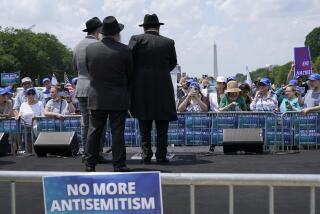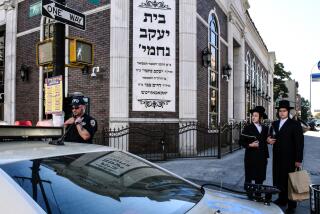Belief in Afterlife Found Greater in Gen-Xers
- Share via
NEW YORK — America not only retained its religious vitality over the last century, but the children and grandchildren of immigrants have increasingly joined the ranks of the faithful, two studies indicate.
The percentage of Catholic, Jewish and unaffiliated Americans who believe in life after death has jumped substantially from the generation born in the first decade of the 20th century to the generation born in the 1970s, according to one study.
A separate international study shows that less than 1% of Americans are what the study calls “hard-core atheists,” people who both do not believe in God or the possibility of life after death.
Sociologist Andrew Greeley of the University of Chicago, who was involved in both studies, told a recent meeting of the American Sociological Assn. in Toronto that the vibrant “marketplace” for religion in the United States has boosted the faith of succeeding generations of immigrant families.
“In a competitive religious marketplace like the United States,” Greeley said, “the clergy must work hard at what they are supposed to be doing: preaching a message of hope in the face of the tragedies of life.”
In the international study, Greeley and Wolfgang Jagodzinski, a sociologist from the University of Cologne, examined findings from the 1991 International Social Survey Program to compare data on atheism and belief in 17 countries.
What they found was a wide range of beliefs related to social attitudes toward religion and levels of religious competition.
In East Germany, where the former Communist government mounted an effective anti-religion campaign, the percentage of people who did not believe in God and rejected the possibility of life after death was 42%.
Even in two relatively highly religious societies, competition proved to be significant. Catholics in Northern Ireland, where there is fierce competition with Protestants, were more likely to attend Mass regularly and to believe in God, heaven and hell than Catholics in Ireland, where the faith has a near-monopoly.
The United States, where several religious groups compete intensely for members, had an almost negligible percentage of nonbelievers. Only 0.8% said they did not believe in God or the possibility of life after death. And just 3.4% of Americans were considered even among the “softest-core” atheists--those open to the possibility of God and life after death.
In the study presented to the American Sociological Assn., Greeley examined data gathered from 19,381 respondents interviewed from 1973 to 1994 in the General Social Surveys conducted by the National Opinion Research Center at the University of Chicago.
To get a picture of how beliefs have changed through the century, he divided the responses by generations, factoring out differences between older and younger respondents that would be solely attributable to age.
In his analysis, Greeley found no statistically significant differences in church attendance or belief in God this century.
Where there was significant change was in belief in life after death, what Greeley calls perhaps “the most central of religious doctrines because it asserts, in the face of substantial evidence to the contrary, that there is purpose and grace in the human condition.”
About three-quarters of those surveyed born in the first decade of this century said they believed in life after death, compared with 81% of those born in the 1970s.
Where the significant gains came from were the Catholic and Jewish believers, who had large numbers of immigrants earlier in the century. The percentage of Catholics who believe in life after death rose from 68% for those born at the turn of the century to 84% for those born in the 1960s. The percentage of Jewish believers in life after death rose from 24% to 40%.
More to Read
Sign up for Essential California
The most important California stories and recommendations in your inbox every morning.
You may occasionally receive promotional content from the Los Angeles Times.









